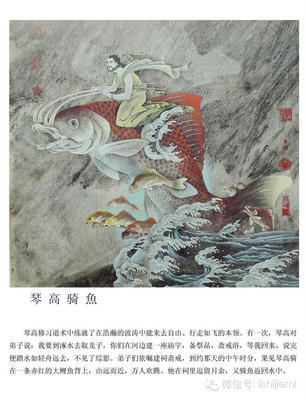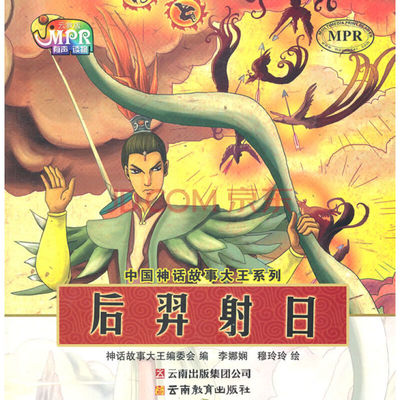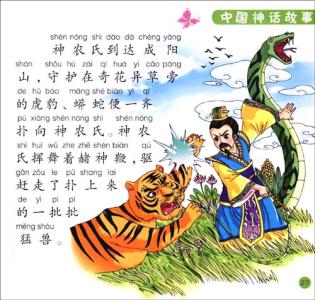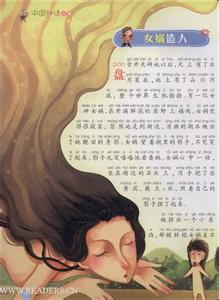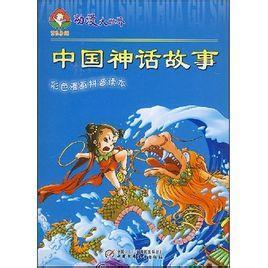中国神话故事是中国古代人们经过长期的社会实践,在劳动生活的过程中创造出来的一种文学样式。中国神话故事在民间口耳相传,它的神奇、瑰丽,反映出无穷的艺术魅力。下面小编为大家带来经典中国神话故事,欢迎大家阅读!
经典中国神话故事:三王墓Gangjiang and Moye, who were husband and wife and lived in the state of Chu, were obliged to forge swords for the king. Three years had passed before they could finally produce them. Annoyed, the king intended to kill Ganjiang. The couple made two swords, one male, the other female. Just then Moye, the wife, was about to give birth to a child. The husband said to her,"Since it has taken me three long years to make the swords, the king must be angry. It is certain that he will put me to death when I go and present the swords to him. If the child turns out to be a boy, tell him this as soon as he is grown up, `Go out of the house, look at the southern mountains and search for the place where a pine tree is growing on a rock. Try to find one of the swords on its back.'" After he had said this, Ganjiang left for the palace with the female sword. The king became furious when he saw only one sword, and ordered it to be examined. When he was told that there were actually two swords, one male and the other female, and that the one he saw was female, while the male one was not there, the king flew into a rage and had Ganjiang beheaded at once.
楚国铸剑名将干将替楚王铸剑,过了三年才铸成。楚王发怒,想要杀掉他。铸成的剑有雌雄两柄。干将的妻子莫邪怀有身孕,即将临产。干将对妻子说:“我替王铸剑,过了三年才铸成。王发怒,我去送剑,王一定会杀我。你生下孩子,假若是个男孩,等他长大成人,告诉他说:‘出门望着南山,松树长在石头上,剑就在松树背上’。”于是干将就带着雌剑去见楚王。楚王大发脾气,派人察看干将带来的剑。剑有两柄,一雄一雌。干将莫邪只带来了雌剑,雄剑却没带来,楚王发怒,就把干将杀了。
Moye named her son Chibi. When he grew up, he asked her, "Where is my father?" "Your father once had to forget two swords for the king," Moye replied, "and it took him three years to finish them. The king killed him in a fury. Before he left home, your father asked me to give you this message, 'Go out of the house, look at the southern moun tains and search for the place where a pine tree is growing on a rock. Try to find one of the swords on its back.'" So the boy ran out of the house and looked south, but he saw no mountain at all. Then his eyes fell on a stone plinth in front of the house, with a pine pillar on its top. Chibi hurried to cleave the pillar from behind. Sure enough, there was the male sword. From that time on, Chibi planned day and night to avenge his father.
干将和莫邪的儿子名叫赤,等到赤长大成人,就问自己的母亲说:“我的父亲在什么地方?”他的母亲说:“你父亲替楚王铸剑,过了三年才铸成,楚王发怒,杀了他。他临离家时嘱咐我:‘告诉你的儿子,出门望着南山,松树长在石头上,剑就在松树背上’。”于是赤出门向南望,看不见有山,只看见堂前松木屋柱竖立在石砥之上。赤就用斧头砍开松柱的背面,拿到了剑,日夜想着向楚王报父仇。
The king had a dream one night, in which he saw a boy, whose eyebrows were one foot apart from each other, swearing to take vengeance for his father's death. The king offered a reward of one-thousand taels of gold for the capture of the young lad. Chibi heard the news and had to take to the mountains. On his way he went singing sad songs, when a stranger came up and asked, "Why are you so sad, young man?" "I am the son of Ganjiang and Moye," replied the boy. "Because the king killed my father, I'm determined to take revenge." At this, the stranger said, "People say that the king has set a price of one-thousand taels of gold on your head. If you could give me your head and the sword, I would take revenge for you." "Good!" said the boy. He cut off his own head and handed it, together with the sword, to the stranger. But his body stood where it was until the man vowed, "I will not let you down!"
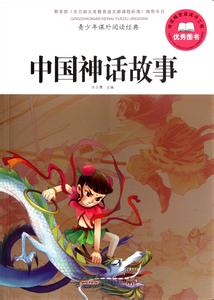
楚王梦见一年青人额头很宽,说是想要报仇。楚王就悬千金重赏,捉拿这年青人。赤听到这个消息就逃走了,逃进山中边走边唱。一个游客遇见赤,对赤说:“你年纪这么小,为什么哭得这么悲伤呢?”赤回答说:“我是干将和莫邪的儿子,楚王杀死了我的父亲,我想给他报仇。”游客说:“听说楚王悬千金重赏要得到你的头。把你的头和剑拿来,我替你向楚王报仇。”赤说:“好极了!”马上就自杀,割下头,两手捧着头和剑送到游客面前,身躯直立不倒。游客说:“我不会辜负你。”于是赤的尸身才倒下。
The king was pleased when he saw the boy's head. "Since this is a brave man's head," said the man, "it should be boiled in a cauldron to prevent further trouble." This the king did. Three days and three nights went by, but the head remained intact. And it was bobbing on the water, the eyes burning with anger. "The head will not decompose," the stranger said to the king, "would you just come over and take a close look. Then it will surely go." The king came. As soon as he bent forward, the stranger swung his sword and chopped off the king's head, which dropped into the cauldron. This done, the man killed himself, his head also falling into the broth. In no time, the three heads became mashed and were no longer recognizable. Later, the broth, with what was left of the heads, was divided into three parts and buried in three graves, which came to be called "the Graves of Three Kings." Today they can still be found in Yichun County north of Runan.
侠客拿着赤的头去见楚王,楚王非常高兴。游客说:“这是勇士的头,应当在滚烫的镬中把它煮烂。”楚王就按着游客的话来煮头,煮了三日三夜还没煮烂。头还从滚烫的水中跳起来,瞪大眼睛,显出怒气冲冲的样子。游客说:“这年青人的头煮不烂,希望大王亲自到镬旁观看,这头就一定会煮烂。”楚王就到镬旁看。游客用剑对准楚王的头砍下去,楚王的头随着剑势掉入沸水中。游客也对准自己的头砍下,头又坠入沸水中。三个头一起煮烂了,不能识别。人们只好从沸水中分出烂肉和三个人头一块儿埋葬,所以笼统地称作三王墓。地点在现在汝南境内的北宜春县。
经典中国神话故事:精卫填海Long long time ago, there lived a little princess named Niu Wa who was the youngest daughter of Emperor Yan, the legendary ruler in ancient Chinese mythology.
精卫填海讲的是中国古代神话中炎帝宠爱的小女儿女儿的故事。
The littel princess loved watching the sunrise, admiring the spectacle of nature. She once asked her father where the sun rises. Her father said it was in the Eastern Sea and promised to take her there to see sunrise on a boat, but he had been too busy to do that.
女娃很喜欢看日出,喜欢大自然。她很想让父亲带她出去,到东海——太阳升起的地方去看一看。可是因为父亲忙于公事:太阳升起时来到东海,直到太阳落下;日日如此,总是不能带她去
One day, the little princess got a boat behind her father's back, sailing to the Eastern Sea. When she was away from the shore, unfortunately, a strong wind rose and overthrew her boat. She was buried by the surging waves, being drowned quickly.
这一天,女娃没告诉父亲,便一个人驾着一只小船向东海太阳升起的地方划去。不幸的是,海上突然起了狂风大浪,像山一样的海浪把女娃的小船打翻了,女娃不幸落入海中,终被无情的大海吞没了。
After her death, her spirit turned into a beautiful bird with white beak and red claws. Since it often stood on a branch, mourning herself sadly in the sound "jing wei, jing wei", people called it "Jing Wei".
女娃死了,她的精魂化作了一只小鸟,花脑袋,白嘴壳,红色的爪子,十分可爱,可发出的,却是“精卫、精卫”的悲鸣,所以,人们便叫此鸟为“精卫”。
Jing Wei hated the sea very much for taking her life. In order to revenge and keep other kids from being drown, the small bird decided to fill up the roaring sea.
精卫痛恨无情的大海夺去了自己年轻的生命,她要报仇雪恨。因此,她一刻不停地从她住的发鸠山上衔了一粒小石子,展翅高飞,一直飞到东海。
From then on, Jing Wei flew to and fro between the mountain and the Eastern sea, carrying a twig or a pebble and dropping it into the sea. Day after day, it never stopped.
从此以后,她在波涛汹涌的海面上回翔阒,悲鸣着,把石子树枝投下去,想把大海填平。
Puzzled by its behaviors, the sea said to Jing Wei with irony, "Stop doing that, poor little bird, it is totally meaningless! You'll never fill me up."
大海奔腾着,咆哮着,嘲笑她:“小鸟儿,算了吧,你这工作就干一百万年,也休想把我填平!”
To it, Jing Wei replied firmly, "I'll fill you up no doubt! I will, even if it'll take me thousands of years! I'll fight on until doomsday!"
精卫十分执著,在高空答复大海:“哪怕是干上一千万年,一亿年,干到宇宙的尽头,世界的末日,我终将把你填平的!
The brave little bird kept carrying twigs and pebbles from the mountain to the Eastern Sea without taking a rest.
她衔呀,扔呀,成年累月,往复飞翔,从不停息。
 爱华网
爱华网